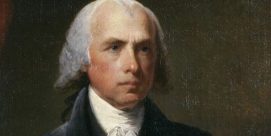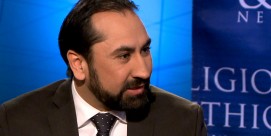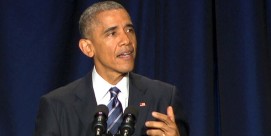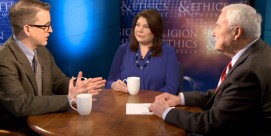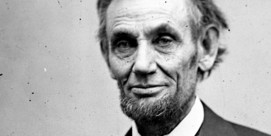Andrew Finstuen: The Politics of Angels and Demons

One of the more boisterous moments of President Barack Obama’s State of the Union speech came when he stated his belief in what Abraham Lincoln believed before him: “That Government should do for people only what they cannot do better by themselves, and no more.” The House chamber erupted with applause and shouts of approval—none louder than from the mouths of Republicans.
But this moment was little more than another lesson in party difference. The speech actually confirmed Obama’s belief that there is a lot people cannot do better by themselves. They cannot fund massive and necessary public works projects; they cannot fund equally massive research breakthroughs like those connected to natural gas extraction; they cannot be counted on to levy fair taxes; and, as he observed several times, they cannot be trusted to uphold sound financial rules and practices.
In contrast, the GOP response from Indiana Governor Mitch Daniels confirmed that Republicans believe there is little government can do better than the individual: “government is meant to serve the people rather than supervise them.” This is Party Politics 101. To borrow from Lincoln’s First Inaugural Address, Democrats have faith in the “better angels” of the federal government while Republicans trust in the “better angels of our nature.”
Both parties trust in the better angels of the military. Obama opened and closed the speech with resounding praise for the military’s teamwork and self-sacrifice, and he called for Congress and America to emulate both traits. There is much to admire about the armed forces and the veterans who serve in them. Yet we should honor their service without elevating them beyond reproach. Otherwise we patronize our veterans—as Obama did when he said, “they exceed all expectations;” lack “personal ambition”; “don’t obsess over their differences.” We neglect the reality that “war is hell. ” And we obscure the undemocratic nature of the military. The democratic system may at times feel like hell, but it is one made from the luxuries of debate, disagreement, compromise, and representative government, not chain of command and direct orders.
By Lincoln’s Second Inaugural, after four years of bloody civil war, he no longer spoke of the “better angels of our nature.” Instead he asked for “malice toward none” and “charity for all” in an effort “to bind up the nation’s wounds” and establish “a just and lasting peace among ourselves and with all nations.” Our crisis is ideological civil war, and like his predecessor Obama urged the nation toward political cooperation in service to an “America built to last.” But he argued that its longevity depends upon whether we “settle for a country where a shrinking number of people do really well while a growing number of Americans barely get by” or for a country “where everyone gets a fair shot, and everyone does their fair share, and everyone plays by the same set of rules.” This economic wound will not heal without profound disagreement—that is the nature of democracy—but Obama hopes that we might bind it charitably and without malice.
Our disagreements about it and the other major issues of the day have devolved, however, into silliness, even absurdity. We are a nation of finger pointers, unrelenting, disingenuous, and uncharitable in laying blame at the feet of others for the political and economic disarray of our times. But, as Obama has argued throughout his presidency, if Democrats and Republicans see angels when they look in the mirror and demons when they look at each other, then we cannot expect that the “state of our Union will always be strong.”
The scariest commentary on our natures is that there are national leaders and everyday Americans who believe in political angels and demons, and there are those who do not but allow the charade to go on anyway.
Andrew Finstuen is director of the Honors College and associate professor of history at Boise State University.

